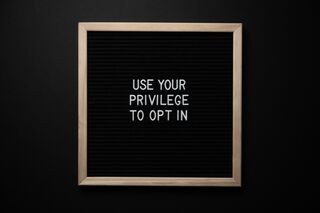Teamwork
Privilege Checklists Can Be Toxic to Corporate Cultures
It’s the cheap and trendy “fix” that might cause long-term damage.
Posted May 13, 2022 Reviewed by Tyler Woods
Key points
- Big corporations are embracing “privilege checklists” for their workers.
- Privilege checklists and shaming are cheap and easy ways to score quick DEI and ESG points.
- But creating a new class of people to be excluded from actively contributing is not the path toward innovation.
- lt does nothing to build trust with people that ultimately might have the skills or resources needed to achieve corporate goals.

My last post on shaming privilege received considerable news media attention (like this Salon article, for example), and the ensuing discussions raised some timely and important questions about the implications for work.
The move by increasing numbers of big corporations to normalize privilege shaming as part of their corporate culture is gaining steam. In the recent news cycle, there have been stories about Home Depot and Disney embracing “privilege checklists” for their workers. This is a worrying trend that needs to be reversed.
Why is privilege shaming problematic?
"Shaming," as I understand it, is a tactic used to elicit a negative emotional state in a target for the perceived violation of a social norm. For shaming to be effective, however, the target needs to accept the validity of the social norm they are accused of violating.
In other words, you can shame me for doing something I knew was wrong at the time of the infraction, like deliberately using a slur in a heated moment. Or you can shame me by getting me to see how wrong my actions were after the fact, like using a word that I thought was innocuous, but which turned out to be a slur. In both cases, though, there is a necessary precondition—we must agree that using slurs is undesirable behavior.
Is holding "privilege" undesirable behavior? Some people now think so, but I disagree. Consequently, privilege shaming becomes problematic for two main reasons. First, there are reasonable people being targeted who may not agree with the assessment that they hold unearned social power. Second, there are reasonable people who may view holding privilege as morally neutral.
Privilege shaming is a tactic, not a strategy.
Before companies decide to introduce elements of privilege shaming into their corporate culture, there needs to be a deep dive into how this tactic might affect their strategy. What’s the long-term vision for corporate identity?
If a company is looking to facilitate superior cooperation amongst their workforce, empower more people to be co-creators, and improve social mobility for stakeholders, then there are far better tactics to support this reformist agenda.
Folks holding privilege are often in a good position to help with these issues if they are so motivated. And a great way to demotivate them is by offering a scolding lecture about something as abstract and contentious as unearned social power, especially if they don't believe they actually were conferred such powers.
Creating a new class of people to be excluded from actively contributing is not the path to innovation and progress. Being a “team player” who is told to step aside is a lot like the feeling after winning a participation award. It’s something… but not all of it is good.
Privilege shaming assumes all "unearned" power needs to be given up. The mere presence of, for example, a white male in certain positions of power is seen as actively preventing others from claiming their fair share. But who gets to define what was earned and what wasn't?
If the company’s long-term strategy seeks a more revolutionary agenda, like a radical vision of equity where one group is replaced by another, privilege shaming is still a poor tactic. Any targets in the company’s community who believe that those with perceived unearned social power should remove themselves from continuing to participate constructively or who bear so much internal guilt that they will wilfully step aside will likely have already done so. But those so-called "privileged" stakeholders who remain are going to fight.

Why are corporations adopting privilege checklists?
Given these objections, it's fair to wonder why corporations are adopting privilege checklists to begin with. The short answer is that privilege checklists and shaming are a cheap and easy way to score quick diversity, equity and inclusion (DEI), and environmental, social, and governance (ESG) points in a market that demands it. By focusing on privilege, top management teams avoid having the difficult conversation that needs to be had under the rubric of corporate social responsibility, which is: How do we, in a diverse, liberal society, improve cooperation, empower more people to be co-creators, and expand opportunities for upward social mobility?
Shouting about privilege will do nothing to build trust with people who ultimately might have the skills or resources needed to achieve corporate goals. It may force some folks to remove themselves from the game. But that’s not a good thing. And it won't change the minds of those rejecting the call to step aside or incentivize them to use their power differently.
There is an arrogance in DEI consultants claiming to know, based on a snapshot of identity, the substantive content of someone’s social power, the extent to which it is unearned, and the confidence that their continued holding of that power won’t prove to be for the best down the road.
Further, there is an impatience on display, because privilege shaming is born of a view dismissive of the possibility that the incremental expansion of cooperation and the slow work of building mutual respect across diverse communities over time is good and worthwhile.
Shaming as a corrective technique to address the problems of privilege is choosing the quick and dirty path of inflicting emotional pain, oftentimes without a robust understanding of the extent of the harm being done and how it may spiral, instead of the longer path of relationship-building and accepting that social progress may be slower than we would like.
Leading antiracist consultant Ibram X. Kendi tells us that “patience” is “a dirty word,” an argument which currently resonates with many business leaders and influencers. But impatience can lead to short-sightedness. While privilege checklists may succeed in shaming some folks, getting media attention, and quieting your corporate critics for a little while, there is no fast-tracking the arduous and messy work of building broad coalitions for lasting change and progress.




